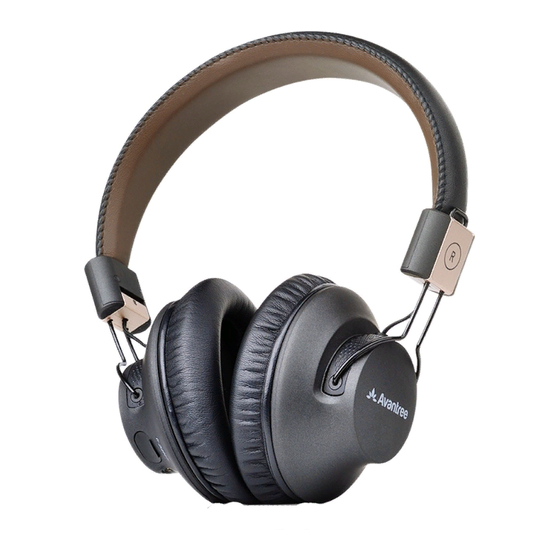Avantree BTHS-AS9P Podręcznik użytkownika - Strona 9
Przeglądaj online lub pobierz pdf Podręcznik użytkownika dla Słuchawki Avantree BTHS-AS9P. Avantree BTHS-AS9P 10 stron. Low latency wireless headphones
Również dla Avantree BTHS-AS9P: Podręcznik użytkownika (6 strony)

Clearing paired history (Bluetooth & Broadcast)
Turn on headphones (do not activate Broadcast function), hold and together for 5 seconds until the LED
blinks Blue and Red together (looks PINK) for 2s.
To restart the headphones
If the headphones DO NOT respond, please recharge the headphones or connect the headphones with
any audio device via the 3.5 mm audio cable.
Headphones do not pair with Bluetooth device
1. Ensure the AS9P is in Pairing mode – LED will ash BLUE and RED alternately.
2. For Bluetooth transmitter, ensure the transmitter is in Pairing mode – please refer to user manual.
3. For mobile phones, tablets and PCs
· Turn the Bluetooth o then on again.
· Delete/forget the "Avantree AS9P" from your device's Bluetooth list and then try to pair again
· Clear the headphone's pairing history, and pair again
· Pair and connect
WARNINGS / CAUTIONS
• Permanent hearing loss may result from long-term exposure to sound at high volumes.
• This product contains small parts which may be a choking hazard. Not suitable for children under age 3.
• To reduce the risk of re or electrical shock, do NOT expose this product to rain, liquids or moisture.
• Do NOT make unauthorized alterations to this product.
• Do NOT expose products containing batteries to excessive heat (e.g.direct sunlight, re, etc.).
• Do not leave a fully charged battery connected to a charger;overcharging may shorten its life.
Declaration of Conformity
CE: The product is in conformity with the essential requirements of Article 3.1 (a) (b),3.2 of Directive
1999/5/EC and the essential requirements of Directive 2004/108/EC.
This device complies with part 15 of the FCC Rules. Operation is subject to the condition that this device
does not cause harmful interference (1) this device may not cause harmful interference, and (2) this device
must accept any interference received, including interference that may cause undesired operation.Chang-
es or modi cations not expressly approved by the party responsible for compliance could void the user's
authority to operate the equipment.
NOTE: This equipment has been tested and found to comply with the limits for a Class B digital device,
pursuant to Part 15 of the FCC Rules. These limits are designed to provide reasonable protection against
harmful interference in a residential installation. This equipment generates uses and can radiate radio
frequency energy and, if not installed and used in accordance with the instructions, may cause harmful
interference to radio communications. However, there is no guarantee that interference will not occur in a
particular installation.If this equipment does cause harmful interference to radio or television reception,
which can be determined by turning the equipment o and on, the user is encouraged to try to correct
the interference by one or more of the following measures:
-- Reorient or relocate the receiving antenna.
-- Increase the separation between the equipment and receiver.
-- Connect the equipment into an outlet on a circuit di erent from that to which the receiver is connected.
-- Consult the dealer or an experienced radio/TV technician for help.
8
